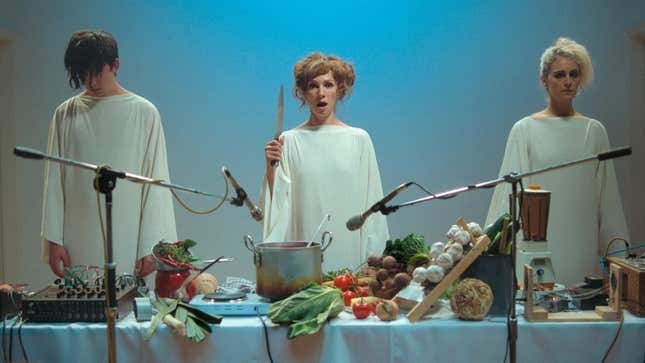Playing With Food Gets Absurd (and Gross) in ‘Flux Gourmet’
Writer-director Peter Strickland discusses his movie's wholly unique approach to sound, vulgarity, and fart representation.
EntertainmentMovies

Flux Gourmet, the new movie by writer-director Peter Strickland (In Fabric, The Duke of Burgundy), follows an avant garde sonic collective who takes playing with food very seriously: They amplify and manipulate the sounds of cooking to create aural collages. It is based on a true story, or at least a real band—Strickland’s own Sonic Catering Band, which formed in the ‘90s and reunited to create the collages heard in Flux Gourmet. The movie presents this way of sculpting sound as a bonafide genre, as the nameless group we follow take up residency at an institute devoted to boarding artists who work specifically in culinary performance. The idea is weird, but Flux Gourmet extrapolates it so that, as Strickland told Jezebel during a recent phone conversation, “the absurdity of it becomes normal in the end.”
That isn’t the half of it. Power struggles abound, both within the group (whose members are played by actors Asa Butterfield, Ariane Labed, and Strickland mainstay Fatma Mohamed) and without; Jan Stevens (Game of Thrones’ Gwendoline Christie) runs the institute and attempts to meddle in her residents’ creative process. Meanwhile, while the collective is intentionally making sounds with their food, in-house documentarian Stones (Makis Papadimitriou) is making unintentional ones with his body. Stones suffers from a condition that gives him painful gas—several voice overs in Greek detail the lengths he goes to in order to conceal and stop his farts—but whereas other movies play flatulence for comedy, in Flux Gourmet it is no laughing matter, by Strickland’s design.
Flux Gourmet is classic Strickland—reminiscent of his and others’ previous works but truly unlike anything that’s come before it. He talked to Jezebel about his creation, his feelings about farting representation, and his as-yet-unmade film that takes place among gay men in pre-AIDS New York, Night Voltage, which he was having trouble getting off the ground last time we talked, in 2019. A condensed and edited transcript of our conversation is below.
JEZEBEL: In your director’s statement, you say that Flux Gourmet originally started as a “satire on artists and their complex relationship with the institutes that fund their work.” Did experiences making films inspire your commentary on that relationship?
PETER STRICKLAND: I think every filmmaker has had to sit at those tables where someone is telling you to delete things. Someone sitting next to you just stealing all the cookies on the table and not helping. I wasn’t really interested in making a vendetta film where I’m going to get revenge on financiers. If I look at the film, the character that comes out the worst is actually the artist [Mohamed’s Elle]. She’s machiavellian. I saw my job not as some kind of grudge bearer, but as a referee to just be invisible in those meetings and not take sides. I guess my job is to be both compassionate and horrible to all my characters.
My job is to be both compassionate and horrible to all my characters.
The movie presents sonic catering as a genre or a mode. And from what I can tell, the Sonic Catering Band is one of the only groups to make the kind of sounds depicted in the movie. Is there an actual scene, or is this an extrapolation of your work in that band applied to this movie to make a kind of realistic fantasy?
I would say the latter. I mean, I guess I did that too with The Duke of Burgundy, where everyone’s into bondage. When you take something which is considered niche and make it somehow universal in that world, the absurdity of it becomes normal in the end.
It allows for these characters to have completely rational conversations about this medium that is kind of bonkers.
There were a few people doing it. Matthew Herbert was doing [an album about food, 2005’s Plat du Jour]. The Vienna Vegetable Orchestra, but they were slightly different because they were using vegetables as percussion. We never played with food. We would just cook food and record it and document it. It was a very different approach. John Cage was dabbling in it at one point. Aphex Twin used a [food] mixer once. I wouldn’t call it a scene, but there have been examples of that kind of thing before.
-

-

-

-

-

-

-

-

-

-

-

-

-

-

-

-

-

-

-

-

-

-

-

-

-

-

-

-

-

-

-

-

-

-

-

-

-

-

-

-








































